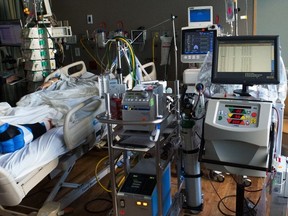Extracorporeal Membrane Oxygenation Therapy
"We already knew that ICU survivors can suffer mental health impacts from the trauma of invasive treatments, living with new physical limitations and dealing with long recovery times.""We suspected ECMO [extracorporeal membrane oxygenation] survivors can suffer mental health impacts from the trauma of invasive treatments, living with new physical limitations and dealing with long recovery times.""We suspected ECMO survivors would be at greater risk of mental health impacts because they are sedated and ventilated for longer and often face a more challenging recovery. But we didn't have clear data until now."Study lead author Dr. Shannon Fernando, critical care physician, Lakeridge Health, The Ottawa Hospital/University of Ottawa"We suddenly have a lot more ECMO survivors because of COVID-19."\"We need to make sure they have the mental health support they need to recover and survive."Dr. Kwadwo Kyeremanteng, co-senior author, scientist, critical care doctor, The Ottawa Hospital"The use of ECMO has grown worldwide, particularly in the context of the COVID-19 pandemic, where ECMO has been used for refractory respiratory failure in cases of severe COVID-19,.""Given the severity of illness found among patients receiving ECMO, its invasive nature, as well as the prolonged duration of therapy and recovery that is often required among those who survive ... survivors after ECMO may be at even greater risk of downstream mental health morbidity than other survivors of critical illness."Research Study conclusion
 |
| MedPageToday |
During the SARS-CoV-2 pandemic extracorporeal membrane oxygenation (ECMO) became the life support of last resort. This extreme treatment aided some critically ill patients to evade succumbing when they were on the brink of death, bringing them back to life. This advanced therapeutic form of life support is proving to be costly in mental health outcomes for some patients, a message highlighted in a new study resulting from research carried out by Ottawa scientists.
Published in JAMA this week, the study found survivors of ECMO experienced a 24 percent elevated rate of mental health diagnoses following discharge, in comparison to other intensive care unit survivors. The extreme form of life-saving therapy temporarily replaces the heart and lungs of patients undergoing heart or respiratory failure, and is in use at five Ontario medical centres, including the University of Ottawa Heart Institute.
Use of ECMO has grown worldwide in response to the COVID-19 pandemic in addressing record numbers of extremely ill patients who present with severe respiratory failure. Ontario had twice as many patients at one point on ECMO as during the pre-pandemic period. Typically, the procedure was undertaken on an infrequent basis in reflection of limits on who might qualify and would be seen to benefit from its use.
ECMO is extremely invasive which accounts for its use on younger patients, with roughly 50 to 65 percent of those who receive the treatment surviving. Most of those survivors are alive five years after receiving the treatment. Researchers from The Ottawa Hospital, the Institut du Savoir Montfort, ICES and the University of Ottawa studied the health records of all ICU survivors in Ontario between April 2010 and March of 2020. 642 ECMO survivors were matched with 3,820 ICU survivors with similar characteristics inclusive of age, sex, mental health history, severity of illness and length of stay.
Of the ECMO survivors, 37 percent were diagnosed with a new mental health condition, identified as depression, anxiety and traumatic disorders, representing a 24 percent higher rate of new mental health conditions than other ICU survivors. Earlier research led by Dr. Fernando found survivors of ICU at higher risk of suicide and self-harm following discharge. In the study on ECMO patients, further heightened suicide and self-harm risk was not seen, but the research recommends a greater focus on patients discharged from ICU and particularly those who received ECMO treatment.
"Patients will need help long after they leave the ICU", commented Dr. Fernando. Patients in his care during the recovery period after ECMO treatment often described to him nightmares and recurring thoughts in keep with post-traumatic-stress disorders. "It became clear it was exceedingly common", he explained.
"As care providers, we can tell our patients that it's common to struggle with your mental health after an ICU admission.""ICU survivors need to realize that they often face months or years of recovery and families and health care providers need to support them."Dr. Peter Tanuseputro, physician-scientist, The Ottawa Hospital
 |
Labels: ECO, Extracorporeal Membrane Oxygenation, Mental Health, Research, The Ottawa Hospital

0 Comments:
Post a Comment
<< Home